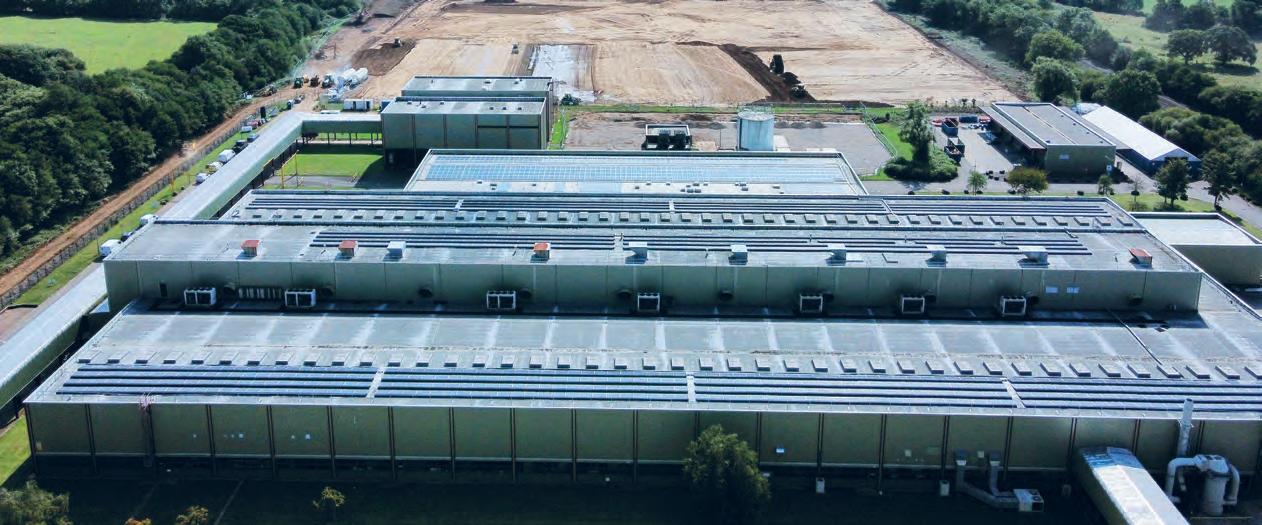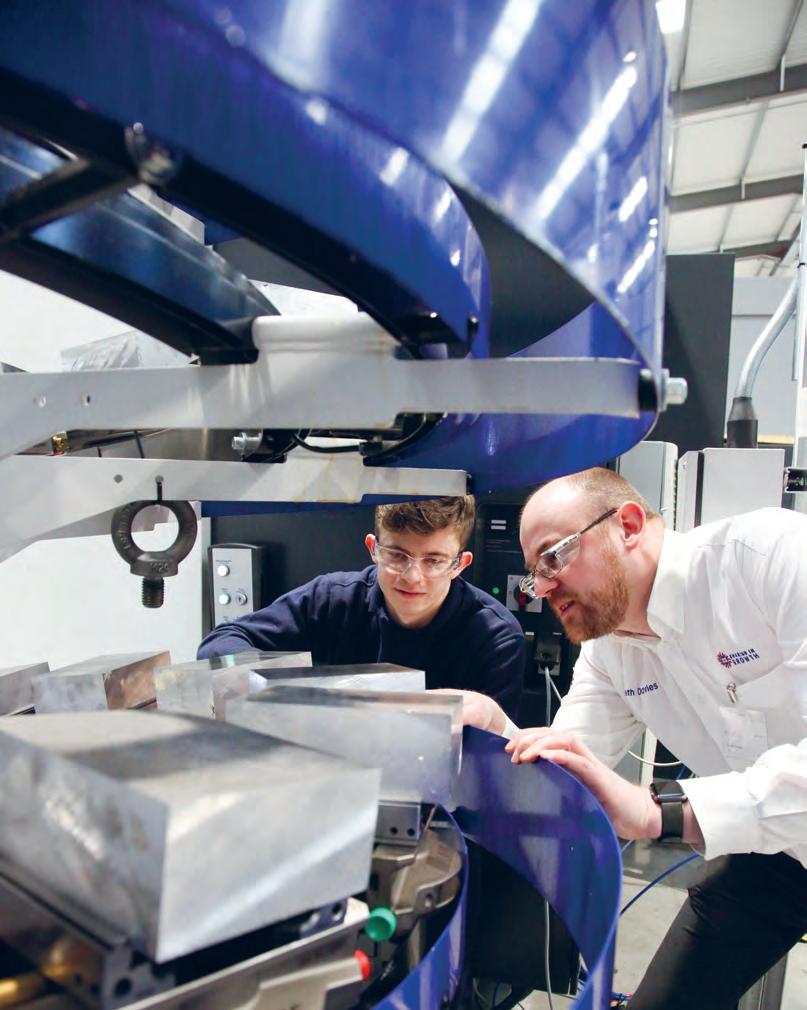
9 minute read
KEY TAKEAWAYS
• Renishaw was founded in 1973 when Executive Chairman, Sir David McMurtry, began tackling a measurement issue when building engines for the original Concorde aircraft
• Today, Renishaw employs 5,200 people in 36 countries, including 3,400 in all its sites in the UK
• The company supply contact and non-contact measurement products, and a wide range of technologies to support manufacturing, medical and science industries
• Key drivers in Renishaw’s five year strategic plan are Harmonisation, Agility, Productivity and Evaluation
• Renishaw is constructing two new halls adding increased manufacturing space with sustainability at its core source of variation in the factory needs to be considered.
This can vary from machine capability, quality of tools, consistency of tool build and good housekeeping around the factory, which would normally require experienced people. All the procedures, work instructions and checklists need to be in place to guarantee that the factory is operating in a consistent manner.
The second step in the pyramid deals with Process Setting; as each batch on a machine is set, factors to consider include critical alignments, setting tools, setting up workpieces and understanding the condition of materials.
That moves on to In-Process Control which covers monitoring, tool wear, drift on the machine, thermal effects of the machining process and tool breakage detection. At the very top of the pyramid Renishaw has Post-Process Monitoring which is the verification of operations of parts.
Paul added: “What makes us unique is that we offer technologies, software and applications experience across all these layers, from machine calibration systems through to final part inspection. And there has been a real benefit to integrating metrology into our CNC machining processes. Indeed, lessons we've learned in our own factory can be applied to our customers and have become products in their own right, which we have then taken to market.
“Our journey has allowed us to learn how to control processes (and set limits on them), configure systems and understand what to do when something goes wrong. All that learning is baked into our intelligent process control software.”
Bringing metrology to the shopfloor
Paul added that increased demands from customers have created a need for actionable data in real-time which has seen metrology deployed on the shopfloor. Previously, there would have been delays around data, both in terms of its collation
ABOVE: Over the last 50 years Renishaw has evolved from crafted manufacturing to technology-enabled precision machining at scale and the decision making needed to act on it. Meanwhile, products would continue to be manufactured in the factory. Paul continued: “Sample routine quality inspections for 1-100 or 1-200 is fine when things are going well. However, if things go badly, this becomes a huge issue for an organisation.
“You then need to establish how many parts have been affected, where the occurrence happened, how many parts need to be remeasured or reworked, and where you need to assign concessions and associated design resources to approve and deviations.
“This is a widespread issue in the industry so by bringing metrology closer to the point of manufacture we are able to react much more quickly, bring processes under control and lessen the impact of quality issues. We can then reduce the cost involved in our quality operations. We also find that this creates increased confidence in the part as it goes through the factory.”
Global manufacturing challenges
The challenges of recent years have meant that manufacturers are having to be far more flexible in their operations, exacerbated by a marked increase in demand from customers and a change in product mix.
Automotive, for example, has seen factories manufacture internal combustion engines, hybrids and battery electric vehicles, all through the same line. Customers want new things, and they want them more regularly, meaning products need to be updated more frequently than before.
From Renishaw’s point of view, this has seen the introduction of an increased level of flexibility in machining processes and inspection to cope with this change in demand. Increased legislation and emissions targets have also created a need to continuously evolve new designs to make products more efficient.
“Methods of manufacturing products and inspection systems can no longer be fixed,” added Paul. “They both need a flexible approach if you want to scale, either from a volume or geographical perspective.”
“Our business has become pretty volatile when compared to a few years ago,” Gareth continued. “We were traditionally selling into OEMs in the machine tool sector, however, now our business is driven more by end users and influenced by what's happening further in the selling chain.”
This has seen Renishaw’s manufacturing model based further around the need to be agile and the capacity to scale in various different scenarios. “We can experience significant shifts in volume at very short notice,” said Gareth. “So, standardisation and rationalisation of equipment is absolutely fundamental to our ability to meet the needs of the business and scale and adapt to changing scenarios.”
Data use
As metrology equipment has been rolled out on the shop floor, and integrated into automation, process control has become increasingly close knit. The data that results can be utilised to keep processes running and for validation. However, it can also provide visualisation into what's going on in the factory.
Paul added: “Just taking a part from a machine shop and looking at the final inspection results is no longer enough. People need to understand exactly how parts have evolved as they’ve gone through the factory, at each stage or machining operation. That data gives the insights that enables you to investigate and prove the quality of processes on the shop floor.”
The company has recently launched Renishaw Central, a data collection system that allows data consolidation from Renishaw and third-party devices. The system provides all the process history of the part as it's gone through the factory. For industries such as medical and aerospace, this is vitally important as it offers a complete audit trail of the part.
“In the wider scheme, we're going to see this data being fed back into product design and PLM systems; gathering data, looking at it over a period of time, and using it to improve processes and product designs on an ongoing basis,” Paul continued.
Legacy and future commitments
Over the last 50 years Renishaw has evolved from crafted manufacturing to technology-enabled precision machining at scale. This transformation has enabled far higher levels of process capability and accuracy in manufacturing which has helped to reduce waste, scrap or rework in the factory; achieve high levels of productivity and efficiency; allow automation in factories; and reduce the requirement for skilled intervention.
Paul added: “Most importantly, however, our evolution has allowed us to improve product performance, efficiency and reliability of things that we see all around us, every day, and that’s what we’re all about. Think of the increase in reliability and efficiency of cars - they rarely leak oil anymore, and that’s because of higher precision manufactured parts working to much closer tolerances.”
While this year Renishaw is celebrating its past achievements, the company is also focused on ensuring the continuing success of the business through investments in people, product development and production capacity; all underpinned by a commitment to be a more sustainable organisation.
In summer 2022, the company announced a significant new investment at its Miskin site in South Wales, to increase manufacturing capacity and to help meet its net zero emissions targets. An investment of around £65m will see a phased development of 400,000 sq ft of additional low carbon buildings at the 193-acre site to the west of Cardiff, consisting of two new production halls and an employee welfare facility.

Gareth continued: “Our Miskin site, which we acquired from Bosch in 2012, is now the largest manufacturing facility within the group. We started manufacturing in 2013 and gradually refurbished the space to a point where we now have two production halls; one looking after product assembly the other component manufacturing. We’re currently around 75% full and the acquisition of the new site has allowed us to take care of strategic risk management by splitting capacity and adding resiliency into the supply chain.”
The existing production halls will also be refurbished to reduce their greenhouse gas (GHG) emissions. This investment will almost double the footprint of the site. The additional capacity will allow for increases to machining operations and the assembly of products already built at the site, including Renishaw’s world-leading metal additive manufacturing (3D printing) machines.
Gareth added: “In the last couple of years, we’ve tried to be more joined up in our strategic thinking – to make sure we evolve and use the latest technology, thus increasing our agility and guaranteeing we can react to all the different market drivers – that’s fundamental to what we do.”
A key topic on Gareth’s agenda is manufacturing productivity, vital to which is establishing common methods and reasoning for decisions taken around business processes right the way across the organisation, and making sure effort is not duplicated and wasted.

He added: “We're trying to harmonise where possible, because engineers are inventive souls by nature. What we have learned is that when processes are separated, it is inevitable that they will be done differently after a certain period of time; a result of someone implementing a good idea to improve part of a process which isn’t then standardised across the sites. We're trying to be more mindful of that as we grow.”
Gareth added that the decision to double the capacity of the Miskin site, which is vital for the organic growth of the business, was a fairly easy one when the company’s aspirations for the next five years are taken into consideration.
The plan is to have the first building completed by the end of this year, with manufacturing assembly moving in soon after. The vision for the second building is around component manufacturing, giving the company further options to split processes where required and increase resilience.
Future talent
A key aspect of investing for future success lies in Renishaw’s ability to retain and recruit skilled individuals across many business disciplines. The company has a strong track record of growing its own talent pool, having started an apprenticeship programme in 1979 and recruiting apprentices every year since that time, even during business downturns. The 50th year will again see a significant investment in future talent, with the aim to recruit around 100 graduates and 60 apprentices in the UK.
However, the hard work starts years before a young person will ever be employed by Renishaw. A science, technology, engineering and manufacturing
(STEM) education outreach programme is run in the South West of England and South Wales by four employees who are dedicated to engagement with both primary and secondary schools.
Following the success of a dedicated education centre at the Miskin site, Renishaw has also opened a STEM education centre at its HQ site in Gloucestershire, which will support students with their science, technology, engineering and maths studies.

Sustainability targets
In 2022, Renishaw announced that in addition to its commitment to achieve a science-based net zero GHG emissions target for all its business operations by 2050, it would also achieve net zero for Scopes 1 and 2 emissions by 2028. Both these targets will be validated and monitored by the Science Based Targets initiative (SBTi). A vital consideration for the new construction programme at the Miskin site is to ensure that this new target can be achieved.


Therefore, the new facilities will be built with the latest technologies and materials to ensure that they will be net zero in operation, and the build also aims to minimise the amount of embodied carbon within the building materials used in construction.
Gareth added: “What we are setting out to do with these new buildings, and overall for this site, is to be able to look people in the eye and certify ourselves as being net zero. All the buildings we're putting up throughout the group have the same target. I've been involved with a lot of buildings over the years, but the difference with this one is we engaged consultants from the start and so sustainability has been built in.”
By the end of 2024, Renishaw also aims to have included new energy efficient cladding and replaced existing heating systems in the two existing production halls.
These sustainability investments complement initiatives at Renishaw’s other global sites, including large investments in roof-mounted solar panels, new car port solar panels, EV charging points to support the company’s move to ultra-low emission (ULEV) fleet vehicles and a new ULEV salary sacrifice scheme, initially for its UK employees, and feasibility studies to assess the viability of wind power.
Gareth added: “The vision within 18 months is for this site to be fully net zero. Part of that journey will be about creating momentum across the group as, with all the properties we own around the world, each will be at differing stages of this journey.

“Therefore, if we can first achieve net zero at one site, we can then share that knowledge with others in the rest of the group and create that impetus. For a company of our size, we've got certain commitments in this space which we need to achieve over the next few years.”
“This was a fantastic night for Gripple and for manufacturing in South Yorkshire!


The Manufacturer MX Awards are the most prestigious manufacturing awards in the country. The entry process and judging criteria are, quite rightly, rigorous and the judges really do put you to the test when they visit. We are so pleased with the feedback we received and will use this to continually improve our operations.”
ENTRY DEADLINE: 7 JULY


The Manufacturer MX Awards consist of ten categories and two overall winners. You can submit for as many categories as you like and entry is free.


Search: TMMX Awards













